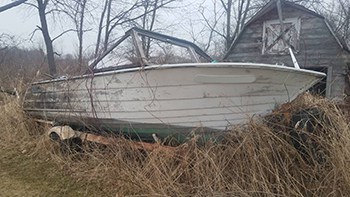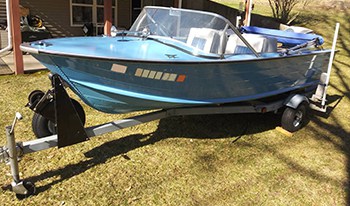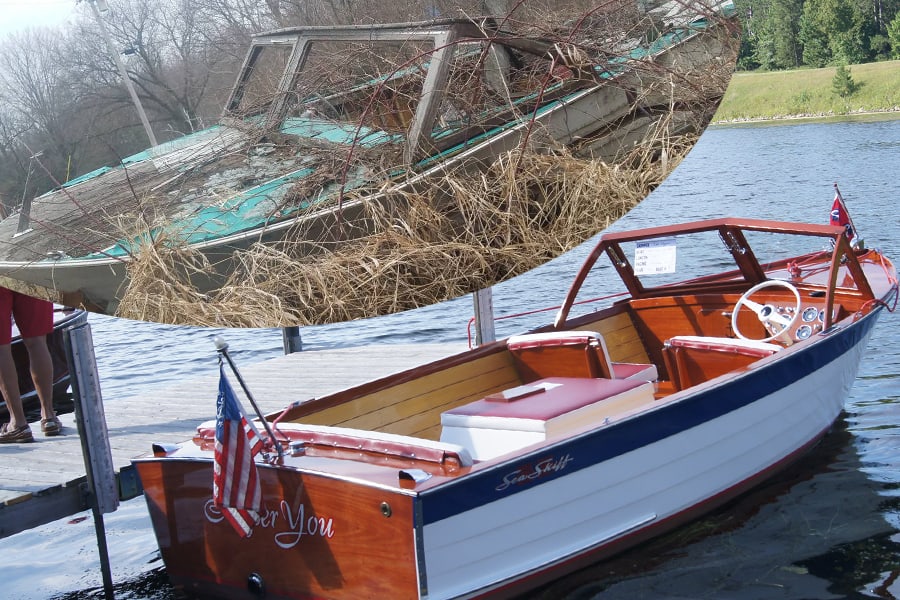Most people who are considering buying a boat, whether new or used, naturally consider how much the boat will cost them over their time of ownership. Everyone should know that, just like most things you buy, they depreciate over time. However, that doesn’t mean you’re not getting a return on your money.
In general, boats lose about 36% of their value after 10 years of ownership. Boats lose between 23% and 30% after 5 years and between 18% and 22% after only 1 year of ownership from a new current year purchase. This is considering the boat being properly maintained and kept in good overall condition.
Obviously there are a lot of variables that come into play with these numbers (like “Condition Is Everything When Reselling”), but I will provide exactly how these percentages were derived. First off, this was considering buying a brand new boat and absorbing the full depreciation, so let’s dive in and find ways to make the numbers work out better.
Depreciation On A New Boat
I did my research on new boats built by two different manufactures that are most common and attainable. For the budget minded boater, we uses Bayliner for our example and for the more premium boat buyer, we used Crownline.
I kept this comparison to just the boat’s value. No trailer was considered, so we didn’t skew the results on the depreciation of the boats.
Both manufactures build great boats, but we wanted to use boats that have different levels in their new boat pricing. These examples also had to be very comparable in boat size and engine horsepower. All boats were bowriders from the 215 series of boats.
During my research, it was very surprising that in forum discussions, an overwhelmingly large percentage of people seem to think that if you buy a higher quality (price) boat, that the boat will retain it’s value better. While there are so many variables that come into play, there may be cases like this, but lets keep going to find out the general truth.
I am going to put a table with the boats and their values to show the rate of depreciation. Again this is using virtually the same boat manufactured by a budget manufacture and a more premium level manufacturer. We’ll discuss the findings right below the tables.
Bayliner 215 Series Depreciation
| Age Of Boat | New Retail Price | Average Retail Today | Total Percentage Of Depreciation | Average Reduction In Value Per Year |
|---|---|---|---|---|
| 1 year old | $36,900 | $30,400 | -18% | -$6,500 |
| 5 years old | $37,213 | $28,490 | -23% | -$1,744 |
| 10 years old | $30,360 | $19,330 | -36% | -$1,103 |
Crownline 215 Series Depreciation
| Age Of Boat | New Retail Price | Average Retail Today | Total Percentage Of Depreciation | Average Reduction In Value Per Year |
|---|---|---|---|---|
| 1 year old | $58,243 | $45,350 | -22% | -$12,893 |
| 5 years old | $50,350 | $35,465 | -30% | -$2,977 |
| 10 years old | $43,650 | $28,050 | -36% | -$1,560 |
As you can see, the overwhelmingly large percentage of people thinking that if you buy a higher quality (price) boat, that the boat will retain it’s value better, are actually wrong. Let’s break down the data and see what reality provides us.
When looking at “boat for boat” between the manufactures, it is clear that the more budget minded choice manufactured by Bayliner Boats loses less money per year in every age category. In fact, even in the worst case scenario of selling your boat at only 1 year old, the Bayliner lost only half or what the Crownline boat lost.
When considering the amount of actual dollars lost from the time the boat was purchased new, the difference between the Crownline and the Bayliner breaks down like this:
- The Crownline lost 29% more than the Bayliner did per year when held for 10 years.
- The Crownline lost 41% more than the Bayliner did per year when held for 5 years.
- The Crownline lost 50% more than the Bayliner did per year when held for 1 year.
Here’s the biggest issue the way I see it from a depreciation standpoint. While the Crownline may have a little nicer finishes, both boats are going to do about the same job for you, because they are the same style, size and horsepower. The issue is that you are paying “a lot more money” to “lose more money” with the Crownline!
But WAIT, there’s more! If you bought the Bayliner used, when it was only 1 year old and then used it for 4 years then sold it, it would have only cost you less than $500 per year to own it! AND the boat was virtually new!
If you did this same used boat scenario with the Crownline, it would cost you about $2,500 per year to own it. These are exact numbers from NADA. So if you really had your heart set on a new boat, then do your research on values. In this case you would be doing great by buying the Bayliner at 1 year old and using it for 4 years of enjoyment and memories.
Depreciation On A Used Boat
 As I just showed you, there are ways to do some research and buy a 1 or 2 year old boat, that turns out costing you very little money if sold within a few years. You can take this same action over and over and realize incredibly low boat depreciation.
As I just showed you, there are ways to do some research and buy a 1 or 2 year old boat, that turns out costing you very little money if sold within a few years. You can take this same action over and over and realize incredibly low boat depreciation.
I can assure you that most people will not do this. Most people buy a boat on a whim. When they decide they want a boat, they want it now. They just want to find one they like and one that the bank says they can afford. “No time for research”, just instant gratification.
Buying a new or near new boat comes with a significant price tag. Since a lot of people will be looking to spend less money for a toy, we should look at some boats that are a bit older. I have had boats that were 20 to 30 years old that had been taken care of with proper maintenance, and were very dependable boats.
For instance, a 20 year old 21′ Bayliner with 220 HP is going to cost about $7,000. Find one that has been taken care of and it will be a great boat for you and your family. I sold one of these that was 25 years old for $6,200. It was a fantastic boat!
The one difference was that mine had a 5.7 Merc in it, which was almost 300 HP. So we have to add about $500 for that difference. So with an equal engine it would have been about $5,700. To own this boat for those five years, it would have cost you about $1,300.
 As a side note, in my experience, it has always been better to select a boat with a higher horsepower engine. They sell better (faster). They are also much more capable in the water, which makes them much more fun to play with.
As a side note, in my experience, it has always been better to select a boat with a higher horsepower engine. They sell better (faster). They are also much more capable in the water, which makes them much more fun to play with.
You could have owned this boat for those 5 years and only depreciated $260 per year. This isn’t perfectly accurate because mine had a trailer and all the NADA quoted boats were just for the boat, but you can buy a trailer for $600. I have bought them for $100 as you will see in other articles. You could always pay more, but why would you if you don’t have to?
Just for reference, I bought that boat for $4,300. I owned it for 6 years (because it was awesome), then sold it for $6,200. I made $1,900 on it after enjoying it for 6 years. Don’t let anyone tell you that you have to lose money on a boat.
Maintenance Expense On Older Boats
It makes sense that there will be more repairs needed with an older boat, but as far as on going maintenance, it will be about the same as a newer boat. Maintaining a boat consists of things like:
- Finding a suitable storage location
- Inspecting the boat for any damage or wear
- Doing any required repairs
- Grease, lubrication, and rust preventative
- Clean and protect your boat inside and out
- Winterizing pre-steps and required supplies
- Steps to properly winterizing your engine(s)
- Outdrive and outboard drive oil
- Removing water from every water system on board and treatment
- Seal out the harsh elements of weather
- Trailer prep and maintenance
This list is from a great article for you to read that covers what it takes to prepare your boat for extended storage, but also shows what a year of maintenance looks like to keep your boat in a great, reliable condition. This is good for you during ownership and makes for a better boat for resale when you are ready to upgrade.
 Again maintaining your boat is about the same process no matter how old the boat is. The difference comes from how often you need a repair as parts wear out. If a boat is not maintained well throughout it’s life, you can expect a lot more ongoing repairs.
Again maintaining your boat is about the same process no matter how old the boat is. The difference comes from how often you need a repair as parts wear out. If a boat is not maintained well throughout it’s life, you can expect a lot more ongoing repairs.
This is why I suggest people take their time and find a boat that has been maintained and in good condition. If they cared for keeping it looking really nice, the oil looks clean and the engine compartment is clean, the boat has been most likely treated very well.
You will find boats that have been maintained at many different levels. You may find a boat that had an owner that cared well for the engine and mechanical’s of the boat, but didn’t necessarily take good care for the boat’s aesthetic looks.
This could still be a great boat to buy at a very good discount. The aesthetics of the boat don’t cause ongoing problems, You repair them and they are as good as new. If you can’t do the work yourself, then find out the cost of professional repair and make an offer on the boat with this in mind.
You could end up making money on your toy! Then you move from a depreciating boat into a appreciating boat.
 A boats value is dependent on what someone will pay. How much the boat depreciates is somewhat controlled by what the seller is willing to sell for (of course there are limits to reality). You can control a boats value by thousands of dollars in some cases, just by doing the right thing for yourself with your maintenance regimen.
A boats value is dependent on what someone will pay. How much the boat depreciates is somewhat controlled by what the seller is willing to sell for (of course there are limits to reality). You can control a boats value by thousands of dollars in some cases, just by doing the right thing for yourself with your maintenance regimen.
Your boat’s depreciation can be considered a return on investment. Let’s say that you owned your boat for five years, and you sold it for $3,000 less than you paid. Considering the annual maintenance and depreciation, let’s say your total “loss” was $5,000.
Every year for 5 years, you took the boat on summer vacation, 10 weekends on local lakes with the family, and 10 fishing days with your buddies. That’s a total of 54 days per year and 270 days of enjoyment, experiences, and memories built with family and friends.
Each day of enjoyment, experiences, and memories built with family and friends cost you $18.52 per day. Where else can you get this level of bonding and enjoyment for $18.52 for a whole day?!
You are not losing money through depreciation, you are investing in the richness of relationships 🙂
Take care of your boat and your boat will take care of you, your family memories, and your wallet.

